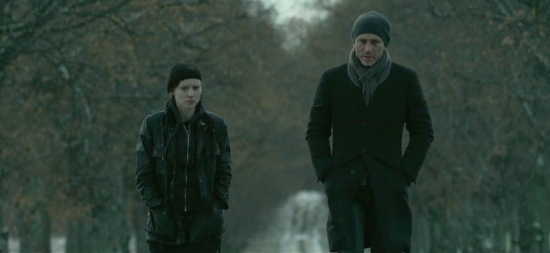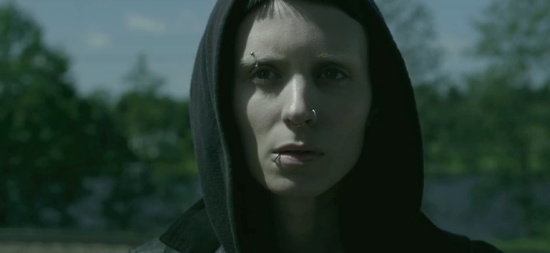The Girl with the Dragon Tattoo (David Fincher, 2011)

I hadn’t read Stieg Larsson’s The Girl with the Dragon Tattoo (or seen its 2009 Swedish film adaptation), so I went into David Fincher’s version of the story with little knowledge or expectation. The striking credit sequence promises a dark and intense thriller, as you’d expect from someone of Fincher’s talent, and indeed I was intrigued for much of the film …until slowly it became apparent just how non-intriguing it truly is.
The film is structured as a modern variation on a classic locked-room murder mystery. Disgraced Swedish journalist Mikael Blomkvist (Daniel Craig) is summoned by the elderly industrialist Henrik Vanger (Christopher Plummer, stepping in for – and virtually doing an impression of – Max von Sydow) to solve the four-decade old mystery of the disappearance of his niece, Harriet. The disappearance occurred on a remote Swedish island while the only bridge to the mainland was cut off, neatly limiting the potential suspects to members of the Vanger family. Blomkvist’s investigation is told in parallel with the story of the marginalised and abused Lisbeth Salander (Rooney Mara), who ultimately joins the quest to discover the fate that befell Harriet Vanger.
Fincher, as always, really knows how to shoot. Here he uses the stark Swedish locations to great effect, and the impact of the setting is intensified by moody music by his Social Network collaborators Trent Reznor and Atticus Ross. Lisbeth Salander is an intriguing character, and Mara’s portrayal of this strong and defiant woman is suitably intense. Through the first half of the film all this is enough.
Yet the film deflates as it goes. Presumably for reasons of length, the family members that are central to the mystery are barely introduced: it’s as if Agatha Christie set-up a murder that had to be committed by one of ten guests at a country mansion, and by book’s end you’d only met three of them. When everything is revealed, the solution turns out to be disappointingly prosaic. And once it’s wrapped up that plotline all too neatly, the film spends a long time on an epilogue resolving a host of further plot points that are largely superfluous to the central story.
No doubt there’s something more interesting going on here for those familiar with the books. For example, there’s an interesting debate to be had about the film’s sexual politics, and how they relate to Larsson’s. The novel’s original Swedish title was Men Who Hate Women, and at one level, the film is the condemnation of misogyny and tribute to survivors of sexual violence that that title implies. Yet I can see, too, the point made by Will Brooker in this article, which is that the film ultimately presents Lisbeth in surprisingly conventional terms.

The character is compelling enough that I would be interested in seeing where the next films in the planned trilogy take her. At the same time, however, I fervently hope those stories are more interesting – or perhaps more suited to adaptation – than this one. And frankly I hope that Fincher chooses to devote his time to something else.
Related Items
My thoughts on Fincher’s The Social Network are here.